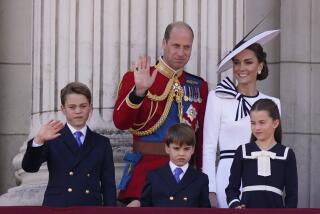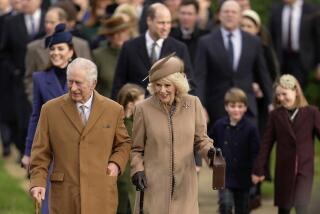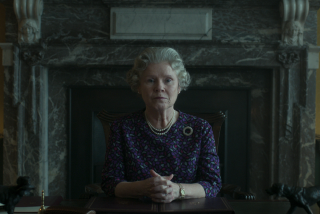Britain Throws Party Fit for Queen
- Share via
LONDON — If the British monarchy were a publicly traded corporation--and who’s to say there won’t one day be an IPO of Windsor Ltd.--the stock would now be climbing as high as the new Typhoon fighter jet that will stage a dramatic flyover Tuesday to cap the four-day Golden Jubilee weekend celebrating Queen Elizabeth II’s 50 years on the throne.
As for such a royal stock’s prospects for years to come, what wizard can predict that? Next to soccer, Britain’s second-favorite sport is handicapping the monarchy’s long run, and Britons use milestones such as this Jubilee for national navel-gazing: Do we still want the monarchy? And if we do, what kind of people does that make us?
The woman at the center of all this is England’s 42nd sovereign in 936 years, and only the fifth to spend half a century on the throne. She is a 76-year-old grandmother who has let her hair go white (actually quite becoming with a diamond tiara), and has let her children go to divorce court. Like Elizabeth I, this Elizabeth was 25 years old when she became queen. It happened at some unknown moment in February 1952, as she was watching wild game from a Kenyan treetop, and as her father, King George VI, died in his sleep.
The four-day holiday marking her half-century reign--the “Greatest Party Weekend in History,” one tabloid promised--began in weather as warm and golden as melted butter. The promising whiff of regimental horse doo--a guaranteed harbinger of a full-on royal event--was briefly accompanied by the scent of smoke from a small fire at Buckingham Palace on Sunday. The blaze interrupted rehearsals for tonight’s pop concert but was soon extinguished. Damage was said to be minimal.
Tonight’s “Party at the Palace” concert, even more than Saturday’s classical concert in the palace gardens, signals a monarchy willing to take its lumps and make changes: 24,000 ordinary Britons out of 2 million who wanted tickets were invited to the two concerts. They didn’t have to be good or accomplished, just lucky.
In the royal box for Saturday’s concert were a conservative politician and--stop the presses--Prince Charles’ girlfriend, Camilla Parker Bowles. In the royal box tonight to hear Paul McCartney, Eric Clapton and Ozzy Osbourne will be liberal Prime Minister Tony Blair and those heartthrob teenage brothers, Princes William and Harry.
Tuesday will begin with a thanksgiving service in St. Paul’s Cathedral, and while the queen will go there in the lumbering gilded state coach, she will depart in her most expensive jubilee gift, courtesy of Bentley: a multimillion-dollar automobile with a bulletproof body and a satellite phone hotline.
But Tuesday will also show the face of New Britain, a parade and show of 20,000 performers, among them a Hells Angel biker, 5,000 gospel choir voices, African and Caribbean performers from the remnants of the Commonwealth so dear to the queen’s heart, and a children’s troupe from London’s Chicken Shed Theater.
Robert Lacey stands atop the ladder of royal writers as the queen stands atop the monarchy. His new book is called “Royal: Her Majesty Queen Elizabeth II,” and he says the monarchy has been able to adapt and flourish since King Charles I was beheaded in 1649 after civil war.
Oliver Cromwell, who took over the nation as lord protector, had himself buried with crowns on his coffin and, kinglike, tried to name his son as his successor. The British preferred the real thing, thank you, and in 1660 happily welcomed King Charles II back to his father’s realm.
The new Britain and its old monarch, says Lacey, are now a match:
“One of the functions of a monarchy in a changing world is to be a beacon of unchanging values. At the same time, it is constantly running for reelection, it constantly has to prove its relevance.”
The pop concert, he said, was “a stroke of genius.” Such music, he said, has “come to symbolize” the new, inventive Britain.
The Golden Jubilee planning started tentatively; the palace as well as critics spent months trying to lower expectations and fretting over costs--critics because they’re critics, and the palace so that if the celebration failed, and especially if it failed expensively, it wouldn’t be compared poorly to the Silver Jubilee of 1977.
But in February, the queen’s sister, Princess Margaret, died, and in late March, the 101-year-old Queen Mother did too. Sympathy rose, gradually joined by the prospect of a good time, and the Golden Jubilee was on.
The Windsors of 2002 are not the family of 1977. They have been changed by years of embarrassments so familiar they hardly bear repeating, which doesn’t stop the press from doing so.
Nor is this jubilee the national street party of 25 years ago, and although some of the old imperial touches are still here--the silver and scarlet, the plumes and the pipes--it is not remotely like Queen Victoria’s Diamond Jubilee of 1897, which showed off with a naval review of ships extending 25 miles. Mark Twain wrote that Victoria’s jubilee procession was “a spectacle for the camera, not the pen,” but added that “one can enjoy a rainbow without necessarily forgetting the force that made it.”
For weeks, Britons have breakfasted on stories about an anti-jubilee guillotine party as well as jubilee festivities in a nudist colony and in prisons. They’ve been told how much the value of their houses has risen since Elizabeth became queen ($8 a day) and how much the divorce rate has gone up since her Silver Jubilee (27%, slightly higher in her own family).
They’ve also been tempted by a glut of jubilee goods, churned out warily. Merchants wondered: Would Americans travel after Sept. 11? Would Britons take the four days and skedaddle off to Sardinia?
But jubilee stuff abounds. Even second-hand shops hung red, white and blue remnants in the windows. Mohammed Fayed, the owner of Harrods department store--who in court once accused the queen’s husband, Prince Philip, of masterminding the crash that killed Fayed’s son and Princess Diana--was evidently not reluctant to make a pile off the jubilee. Before the big weekend, Harrods had sold out of all things jubilee but a few teapots.
And now the High Street shops have genteel competition. Maybe the queen’s father knew better than he realized when he called the royal family “the firm.”
The monarchy has trademarked the names of the queen’s privately owned homes, Sandringham and Balmoral. She has sent the contents of her closets on tour and has exhibited her priceless stamp collection. She has taken pictures off the walls and out of archives to exhibit--some for charity, some toward the upkeep of the treasures. At a joint session of Parliament, the lord chancellor got a laugh when he praised the palace for setting up a Web site and he read out the address like anyone with something to promote. It is often said that the queen hates gimmicks and stunts and spin doctors--but shrewd business is something else altogether.
Most significantly, the Windsor chief executive made it clear in a speech in April that this firm has no mandatory retirement age. She was spiritually anointed to the job, not just promoted. If she were to depart this world tonight, her son and heir, Charles, would have to live until 103 to see his own Golden Jubilee.
The conundrum is that Elizabeth Windsor would not have chosen this life for herself. She has said she’d choose to live in the country with dogs and horses--but she sticks dutifully to it, and will evidently do so to her last breath. It is that, says Lacey, the figure embodying a yearning for community and filling the imagination, that has kept crown and country together.
RELATED STORY
High note: 12,000 Britons attend a palace picnic and concert. F1
More to Read
Sign up for Essential California
The most important California stories and recommendations in your inbox every morning.
You may occasionally receive promotional content from the Los Angeles Times.











